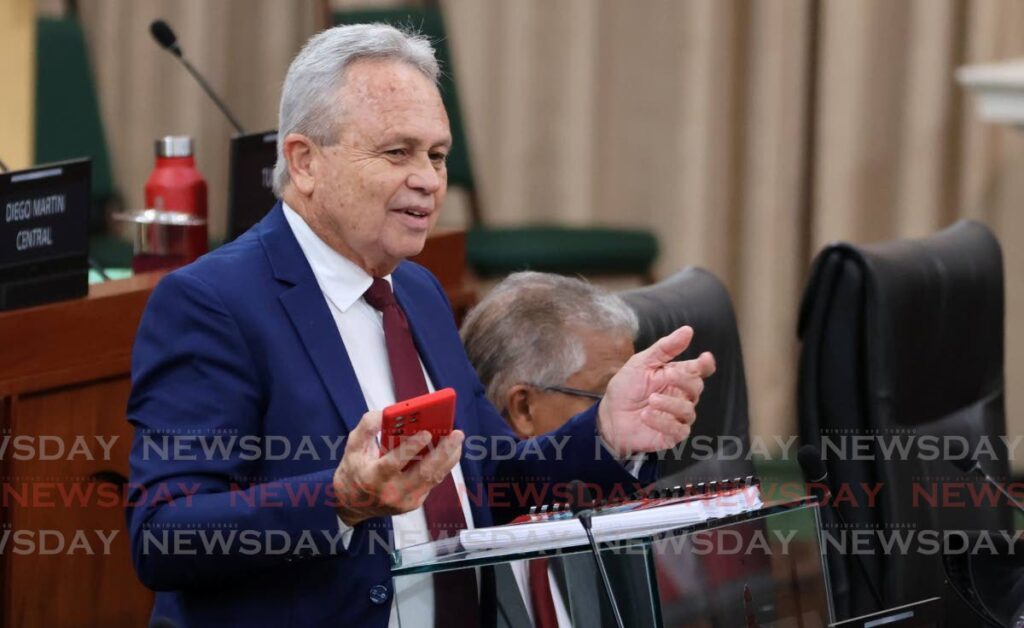Imbert: TTRA fully operational by March

FINANCE Minister Colm Imbert says the Trinidad and Tobago Revenue Authority (TTRA) should be fully operational by March and greatly assist efforts to improve revenue collection through taxation.
Imbert also rejected claims from opposition senators that he had sole power to grant tax amnesties and the granting of such amnesties meant something was wrong with the economy.
He made those comments before the Senate passed the Finance Bill 2024 on November 29.
Imbert told senators the bill dealt with the operationalisation of tax and national insurance amnesties announced in his budget presentation in the House of Representatives on October 30.
He said those amnesties were supposed to take effect on October 1.
"Although that date has passed, I want to make it abundantly clear that the bill is effective from October 1, 2024. Reason being, it confers a benefit."
Imbert said retroactive legislation can be made if it confers a benefit.
He told senators that under the Income Tax Act and other associated laws, Cabinet had the power to waive taxes and duties.
But Imbert added, "The Cabinet does not have the power to waive penalties and interest."
He did not believe any cabinet should have such power.
"I believe that is something that should always be discussed."
Imbert said the rationale the amnesties was to help businesses still struggling to put their house in order after covid19's pandemic phase ended last May.
He told senators the TTRA should be operational by the end of March.
"Therefore at that point in time, they (TTRA) expect to see a vast improvement in enforcement and compliance."
On September 16, the Privy Council in London ruled that the Revenue Authority Act was constitutional, clearing the way for the TTRA to be operationalised.
Imbert said he was confident the authority would be able to increase revenue collection through taxes by $1 billion in its first year of operation with approximate sums of $2 billion and $3 billion to follow in its second and third years respectively.
He added that estimates done by the International Monetary Fund (IMF) sometime ago estimated that tax evasion on Value Added Tax (VAT) could be in the range of $2 to $3 billion annually.
Imbert told senators the IMF had ten regional assistance centres around the world in the Pacific, the Caribbean, in Africa, the Middle East, India and Central America which helped countries in these regions in areas of economic and financial governance.
He disclosed that the IMF's Caribbean Regional Technical Assistance Centre (CARTAC) did assessments of the Inland Revenue Division's (IRD) capabilities in 2017, 2019 and last week.
"In 2017, if there were 28 categories the IRD failed in 27."
"When they came back in 2019, there was no improvement. They (IMF CARTAC) told me it's worse."
Imbert said it underscored the need to operationalise the TTRA which will be formed from the merger of the IRD and the Customs and Excise Division.
He added the amnesties did not "forego in any way the actual tax liability or the actual national insurance liability owed to either the IRD or the NIB (National Insurance Board). It's only the penalties and interest that we are talking about."
Imbert said, "This is why we encourage people to take advantage of these opportunities because if you don't, when December 31 arrives (end of the amnesties), the penalties and interest are restored and then they start to run again."
He added that tax amnesties in the past have seen collection of revenues of approximately $1.6 and $1.5 billion.
Imbert noted the potential of amnesties to create a level of dependency by taxpayers which could eventually give rise to tax avoidance.
He did not envisage the need for such amnesties in the future once the TTRA was fully operational.
Imbert rejected claims from Opposition Senators Wade Mark and Damien Lyder that he had unlimited power to grant tax amnesties, certain entities were always anticipating them and the regular granting of amnesties suggested something was wrong with the economy.
He said by their utterances, the opposition showed they are "masters of hypocrisy."
Referring to Mark's claims, Imbert said this was either based on a misunderstanding of the law or a complete distortion of the facts.
"The power to extend the amnesty is granted to the minister once Parliament approves the (finance) bill. It is not a power that the minister of finance seeks to grant to himself, it is delegated by Parliament."
Imbert reminded senators that the substance of the bill is to grant an amnesty and not do things such as change the taxes being imposed.
"Parliament is not being asked to do that."
Imbert said the opposition's problems with extensions of tax amnesties was also hypocritical.
He recalled that under the UNC-led People's Partnership coalition government, a tax amnesty was granted in September 2010 and extended until June 2011.
Imbert said this happened after then finance minister Winston Dookeran met with IRD officials in May 2011 and it became apparent that people needed more time to pay their penalties and interest.
Looking at opposition senators, Imbert asked them, "If the UNC could do it, why can't I?"
He said the amnesties were opportunities to give people a chance to meet any outstanding tax obligations and not a dictatorial or punitive measure as claimed by the UNC.
Imbert added it is a fact that citizens often wait until the last minute to do things that are important to them.
"We are a last-minute society."
He said any one who believed otherwise, lived in outer space.
The Senate has adjourned to a date to be fixed.

Comments
"Imbert: TTRA fully operational by March"